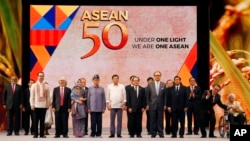Cambodian Prime Minister Hun Sen is set to attend a series of high-profile regional meetings in the Philippines next month, including the U.S.-ASEAN Summit with President Donald Trump, marking the first time the two leaders will meet.
The expected encounter comes amid rising tensions between the two nations and an ongoing political crisis in Cambodia that has seen the main opposition party threatened with dissolution, prompting the U.S. State Department to voice concerns. However, a Cambodian government spokesman and an analyst both said that discussions at the forum would likely focus on business and trade, not democracy and human rights.
Mr. Trump will leave Washington, D.C., on November 3 for his first trip to Asia as president, including stops in Japan, China and South Korea, and appearances at the APEC (Asia-Pacific Economic Cooperation) Leaders’ Summit in Vietnam and the U.S.-ASEAN Summit in the Philippines.
Phay Siphan, spokesman for Cambodia’s Council of Ministers confirmed that Mr. Hun Sen would lead a delegation to attend the summit and would meet Mr. Trump alongside the leaders of the other nine ASEAN nations. Mr. Siphan said he was unsure if the premier would also meet one-on-one with the U.S. president.
Either way, he said the political situation in Cambodia was unlikely to be on the agenda at the summit in Manila on November 13.
"What Cambodia and Trump have in common is the fact of not invading to interfere and overstep the sovereign boundary of each state,” Mr. Siphan told VOA Khmer on Monday.
Citing a meeting between Mr. Trump and Thai junta leader Prayuth Chan-ocha last month in Washington, in which only discussions on business and trade relations were publicized, Mr. Siphan said the same pattern would likely apply in Manila.
“Trump made an example with Thailand by merely talking about the economy. Thus, Cambodia’s top-priority objective [for the U.S.-ASEAN Summit] is to discuss the economy, stability, and peace,” he said.
Mr. Hun Sen made news last year by endorsing Mr. Trump for president, saying the Republican candidate’s inward-looking, America First agenda would contribute to world peace.
However, since the beginning of this year, U.S.-Cambodia relations have deteriorated to one of their lowest points in recent history, driven by fiery rhetoric from the premier, who has insisted that the U.S. is seeking to interfere in Cambodia’s internal politics by encouraging a “color revolution.”
In September, the government arrested and charged Kem Sokha, the country’s main opposition leader, for supposedly conspiring with the U.S. to plot regime change in Cambodia. Just last week, a government-produced video was circulated claiming that the U.S. was helping Cambodia’s opposition politicians, non-governmental organization and commercial financiers plot the overthrow of Prime Minister Hun Sen’s government.
The accusations have been denied by the United States, which, along with other Western donors, has called for the release of the opposition leader, Kem Sokha, to ensure a free and fair parliamentary election next year.
Spokespeople at the U.S. Embassy in Phnom Penh and the U.S. Mission to ASEAN in Jakarta declined to comment on what issues Mr. Trump might raise with Southeast Asian leaders.
Miguel Chanco, the lead ASEAN analyst for the Economist Intelligence Unit, said he expected the upcoming summit to be a “very business-like” occasion at which authoritarian leaders in the region and Mr. Trump would try to maximize mutual benefits.
He agreed with Mr. Siphan that human rights would not be a major topic of discussion.
“For one, the current administration in Washington isn't very interested in promoting human rights and democracy in general,” Mr. Chanco wrote in an email from London, where he is based. “Secondly, he will try to maximise his (brief) time in Asia by promoting the interests of US businesses in the region, the optics of which will cater to Mr. Trump's voter base at home -- indeed, expect to see a lot of deals being announced and/or signed involving US companies during this visit.”
The analyst said that despite the potential to strengthen business ties, he doubted if having the two leaders in the same meeting room would be enough to repair the strained relations between the U.S. and Cambodia.
"Having said that, Mr Trump has proven to be very amenable in 1-to-1 meetings with world leaders and I expect Hun Sen to be alert to any signs that the US president is open to establishing a mutually beneficial and more transactional relationship with Cambodia, one that is largely free from discussions about human rights and democracy,” he added.
However, So Channtha, a Cambodian political analyst, said the U.S. would be unlikely to stop emphasizing human rights and democracy in its foreign policy anytime soon.
“If a U.S. president fails to raise democracy and human rights, I think it will be easy to imagine a declining image of the United States,” Mr. Channtha said. “The United States would lose its popularity.”







